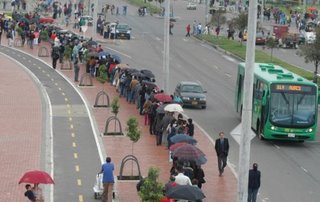Tuesday, May 02, 2006
Para que el paro...
May 2nd, the day after workers' day, Bogota's microbuses went on strike. A new stretch of TransMilenio opened Saturday, and mayor gave the order to put many routes and therefore buses out of service. As necessary as this is, as obvious as it is that Bogota has an abundance of high-polluting extremely old buses, the poverty rate (about 49% in Bogota) and unemployment rate (12.5%, which does not take into account people who have stopped looking for work and those who are underemployed) make putting anyone who is working out of a job a huge problem. I wish there were a way and a will to hire those bus drivers to work for TransMilenio, but the contracting out system precludes TM from hiring more than ticket takers to staff the stations. [Video of protesters frustrated with not being able to travel by bus from Ciudad Bolivar, one of Bogota's poorest municipalities. ]
A good indicator of what would have happened (and what still may happen if the strike has its intended effect) if the now-superfluous routes were not taken out of service is the case of Septima and Caracas. Septima has yet to get its TransMilenio retrofitting, while Caracas was one of the first stretches of TM. Today, Septima has 86% more buses than Caracas, and 50% more particulate matter. 1,100 people die from causes directly associated with air pollution in Colombia annually, and asthma cases, especially among children, have skyrocketed in the past few years.
But today, the city shut down. Classes were cancelled, people with vans drove down the main drags offering their services, and no one talked of anything else at fruit stands and bakeries around the city (my pulse-taking method).
An unintended consequence: commerce may have slammed to a halt, but the air sure was clean. I went jogging down Highway 26, where the moon was shining and I could breathe without choking on exhaust. A full three minutes passed in which not a single vehicle broke the twilit silence. Then someone's old farm truck zoomed past, brimming with stranded people. "A cien, a cien!" they called.
The city lurches forward, but who will be left behind?
Subscribe to:
Post Comments (Atom)



1 comment:
That gave me much more flavor than the noticias en Canal RCN, whose transit reporter, I'm still delighted to note, is in a wheelchair.
I had an idea that Bogota had a high unemployment rate, but I didn't realize the scope of it.
Post a Comment